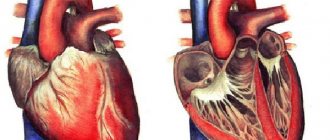List of products containing magnesium and potassium
For the heart and blood vessels, the pharmacy chain has a large selection of medications.
List of medications and dietary supplements (dietary supplements), prices (rubles):
Panangin, 50 tablets 11115.00–199.00Asparkam, 60 T.31.00 Panangin Forte 60 T.322.00 Magnes B6 for the heart, 50 t.448.00 Caliposis Prolongatum, 30 t.450.00kali chloride, Caldium, 30 tablets and magnesium, with Magnesium and magnesium , 40 t.396.00Magnesium sulfate 10 ml, 10 ampoules58.00Magnesium oxide 400 mg, 50 t.978.00Doppelhertz active Magnesium, 30 capsules287.00
Preparations of similar composition from Russian and foreign manufacturers are produced under different trade names.
Indications for use
With a lack of potassium and magnesium in the body, the heart rhythm is disrupted, blood pressure increases, and vascular diseases develop. Medicines, replenishing mineral deficiency, prevent tachycardia, reduce hypertension, and eliminate the risk of heart disease.
Important! Due to these properties, drugs with potassium and magnesium are called antiarrhythmic drugs and cardioprotectors (heart protectors).
Therefore, the main indication for prescribing drugs is to reduce K and Mg in the body. Mineral depletion occurs for many reasons:
- vomit,
- diarrhea,
- profuse sweating,
- eating a lot of salt,
- long-term treatment with diuretics - diuretics,
- insufficient intake from food,
- kidney diseases - tumors, renovascular hypertension,
Emotional stress with the release of catecholamines into the blood also provokes the development of hypokalemia. Signs of K and Mg deficiency are expressed by clinical symptoms.
Hypokalemia (decreased K)
Symptoms of hypokalemia are related to the degree of decrease in K in the blood.
Attention! Most of the potassium is found in the myocardium. Only 2% is found in extracellular fluid. In healthy people, the K content in the blood is 3.5 mmol/l.
If the indicator drops below this level, the first symptoms appear:
- excessive fatigue, constant desire to sleep,
- muscle weakness,
- increasing the amount of urine excreted to 3 liters per day,
- trembling hands, cramps in the calf muscles,
- slow pulse,
- decrease in blood pressure.
With K deficiency, the heart primarily suffers. Tachycardia and arrhythmia appear. K deficiency is clearly visible on the cardiogram. The tape shows characteristic signs of hypokalemia - flattening of the T wave, decreased ST segment. In patients with atherosclerotic cardiosclerosis, ventricular extrasystoles occur. If your heart hurts, this may also be a consequence of potassium deficiency.
By the way! Hypokalemia is often observed in healthy individuals seeking to lose weight with diuretics.
Hypomagnesemia (decreased Mg)
Magnesium affects the contraction of the myocardium, the transmission of impulses from nerves to the muscles of the limbs. Together with calcium, it participates in the development of bone structure. Magnesium deficiency leads to heart rhythm disturbances. Hypomagnesemia significantly affects all body systems.
Symptoms of decreased Mg:
- heartache,
- pressure surges from high to low levels,
- tendency to form blood clots,
- cramps, numbness of the muscles of the lower leg, arms, back, neck,
- loss of teeth and hair, brittle nails due to metabolic disorders,
- chronic fatigue syndrome, manifested by a feeling of exhaustion after sleep.
Usually, when K decreases, magnesium also leaves the body. Mg deficiency most often occurs when there is insufficient dietary intake due to poor nutrition or impaired absorption from the intestines. Alcohol consumption, diarrhea, and kidney disease are also causes of decreased Mg. Some people suffer from congenital hypomagnesemia.
Foods high in magnesium
The list shows the Mg++ content per 100 product:
- Nuts. It is especially important to consume peanuts (182 mg), hazelnuts (160 mg), pistachios and walnuts (120 mg), and the leaders are pine nuts (251 mg).
- Fruits. Watermelon (10 mg), apricot (10 mg), tomatoes (11 mg), citrus fruits (9-10 mg).
- Vegetables. Pumpkin (590 mg), sesame (540 mg), seaweed (170 mg), dill (256 mg), potato (25 mg).
- Cereals and legumes. Bran (440 mg), buckwheat (250 mg), barley (150 mg), beans (140 mg).
- Beverages. Cocoa (245 mg), milk and dairy products (137 mg).
- Dark chocolate (133 mg).
Also pay attention to the infographic:
Magnesium is a microelement that regulates the tone of cardiomyocytes (relaxation), their coordinated interaction in the generation and propagation of impulses.
Role of Mg++
We list the main properties of magnesium:
- It has a protective effect on the endothelium: it protects the inner wall of the artery from damage by turbulent blood flow and during spasm under the influence of stress hormones.
- It has an antiatherogenic effect , that is, it slows down the accumulation of cholesterol on a damaged vessel and the subsequent formation of a plaque, which can transform into a blood clot.
- Disaggregation effect: leads to a reduction in the formation of blood clots due to “thinning” of the blood.
- Vasodilating effect: reduces the tone and general peripheral resistance of blood vessels, which prevents the onset of arterial hypertension and hypertension.
- It helps improve insulin-dependent glucose utilization.
- Strengthens the central nervous system (CNS) and develops immunity to stress. But stress is one of the predictors of the development of cardiovascular diseases), improves performance, relieves fatigue and irritability.
Magne B6 review
This is one of the popular heart medications prescribed by cardiologists and vascular surgeons. The medicine is produced by the famous Hungarian company Gedeon Richter.
Composition of 1 dose Magne B6 tablets:
- 470 mg magnesium lactate,
- vitamin B6 – 5 mg,
- additional substances: magnesium hydroxylicate, acacia gum, talc, magnesium stearate.
The medicine is also available in injection ampoules. Magnesium is found in all tissues and participates in most biochemical reactions. The vitamin is necessary for the proper functioning of nerve fibers.
Magne B6 is prescribed for calf muscle cramps, palpitations, chronic fatigue syndrome, brittle hair and nails.
Adults are prescribed 6 tablets per day in 3 doses after meals, with a glass of water. For children over 6 years of age, the dose is reduced to 4 pieces per day.
In pregnant women, Magne B6 is used only as prescribed by a doctor. The drug passes into breast milk, so women are contraindicated for use during lactation.
Food supplement Doppelhertz active Magnesium
Doppelherz is not a medicine. The product is produced and certified in Germany.
The composition of the dietary supplement (BAA) includes:
- magnesium 400 mg,
- vitamin B1 – 4.2 mg,
- B6 – 5 mg,
- B12 – 5 mcg,
- folic acid 600 mcg.
The combined product covers, but does not exceed the body's daily needs for magnesium and vitamins. The largest amount of the element is contained in the myocardium - the heart muscle. Together with calcium, Mg maintains normal blood pressure.
Plays an important role in the contractility of muscle tissue. With a lack of Mg, cramps of the calf muscles are observed.
Attention! The production of the happiness hormone serotonin is regulated by magnesium. Therefore, with Mg deficiency, depression develops. A person feels sleepy, the brain is tired, and the whole body feels tired even after a night's rest.
Symptoms are especially noticeable in the fall, when vitamin and mineral levels decrease. Magnesium relaxes muscles, calms nerves, helps relieve tension, and improves sleep. Mg has an important property - it forms energy in the body. This is due to the activation of adenosine triphosphoric acid (ATP).
B vitamins are necessary for the functioning of nerve fibers and brain cells. Therefore, when memory deteriorates, doctors prescribe these vitamins.
Folic acid is involved in protein synthesis and oxygen transfer to tissues. Balances a person's emotional state.
The drug is taken 1 tablet per day. One package is intended for a general strengthening course. Thanks to the successful composition of Doppelhertz active Magnesium, it is suitable for overcoming autumn depression.
The role of magnesium in the body
It is difficult to overestimate the effect of magnesium on the human body.
Chronic fatigue, cramps, neuroses and many other symptoms can be caused by a deficiency of this substance.
The normal content of the substance in the human body is about 320 mg for women, and about 420 mg for men.
Magnesium activates enzymes that are involved in carbon metabolism.
A deficiency of the substance can be accompanied by a number of health problems, such as:
- increased blood pressure,
- atrial fibrillation,
- nervous breakdowns,
- cardiac ischemia.
This macronutrient protects the heart from heart attacks and relaxes the heart muscle.
Magnesium has a huge impact on a person’s psychological state. A lack of an element can lead to seizures, nervous breakdowns, and neuroses. With a lack of this macroelement, sleep deteriorates, and cramps often occur at night.
Magnesium content in food
The most magnesium is found in asparagus, soybeans, buckwheat, and brown rice. Hazelnuts also contain a lot of Mg. After processing (cleaning, grinding) cereals, the amount of substance in them is significantly reduced.
Kudesan
Another product has appeared in the line of dietary supplements - Kudesan. The food supplement contains coenzyme Q 10, vitamin E – Tocopherol. The coenzyme is synthesized in the liver, but by the age of 50 its amount decreases. Kudesan replenishes the deficiency of Q 10. The product is available in drops, chewable tablets for children, and a solution for internal use.
Composition of Kudesan tablets for adults (mg):
- active ingredient Ubidecarenone (coenzyme Q10, Ubiquinone) 7.5 mg,
- potassium 97,
- magnesium 16.
Directions for use: 2 tablets per day with food for a month. Potassium and magnesium support the function of the heart and blood vessels. The drug is used for coronary heart disease, atherosclerosis, and chronic fatigue. Kudesan is contraindicated for pregnant women and nursing mothers. Manufacturers claim that the product fights free radicals, therefore prolonging youth and delaying old age for a long time.
Interaction
Concomitant therapy with certain other substances that cause hyperacidity or impaired kidney function may result in excess potassium in the blood. Such medicines are:
- Loop diuretics (diuretics);
- Antihypertensive drugs from the group of ACE inhibitors and hormone antagonists that regulate fluid balance in the body (aldosterone antagonists, such as spironolactone);
- Some drugs for the treatment of Parkinson's disease (muscarinic receptor antagonists);
- Antiarrhythmic drugs;
- Some anticonvulsants (antispasmodics);
- Non-steroidal anti-inflammatory drugs and their harmful effects on the kidneys.
Spironolactone
Panangin and Asparkam
Both medications are prescribed by cardiologists to protect the heart from arrhythmia. Indications are ischemic disease, chronic heart failure.
The composition of Panangin and Asparkam is identical:
- magnesium asparagine 140 mg,
- potassium 158 mg.
If we compare the numbers with the needs of the body, it turns out that these drugs replenish the deficiency of magnesium by 4%, and potassium by 1% per day. Therefore, they are used to prevent arrhythmia and maintain the heart muscle in working condition. Additionally, Magne B6 and Cardiomagnyl are prescribed.
For the treatment of arrhythmia, Hungary produces Panangin Forte with an increased dosage of K and Mg:
- potassium aspartate 316 mg,
- magnesium aspartate 350 mg,
- additional substances: silicon dioxide, corn and potato starch, magnesium stearate.
Panangin Forte is used to treat myocardial infarction, arrhythmia caused by an overdose of cardiac glycosides (Digoxin). Method of administration: 1 tablet three times a day. The course of treatment is determined individually.
The pharmaceutical industry produces other drugs with high dosages of K and Mg - Potassium orotate tablets 500 mg, Kalipoz Prolongatum, Magnesium oxide 400 mg. There are liquid forms for infusion - a solution of “Potassium and Magnesium aspartate”.
Contraindications for use and side effects
There are a number of contraindications and side effects associated with these drugs. In addition, negative interactions with other medications are possible, since many drugs can cause an excess or deficiency of these elements important for the body.
Potassium tablets
This element is eliminated by the kidneys, and when they don't work very well, it can accumulate in the body and cause poisoning. People suffering from diseases of the upper gastrointestinal tract and esophagus, stomach and duodenum should take potassium exclusively in liquid form. Pregnant and breastfeeding mothers should avoid taking such drugs.
Possible side effects:
- nausea;
- constipation and sometimes diarrhea;
- pain or discomfort in the abdomen, possible vomiting;
- may cause internal bleeding.
Magnesium preparations
Such drugs are not recommended for patients with renal failure.
They are also contraindicated when taken together with diuretics, antibiotics, certain heart medications, anticancer drugs and anti-osteoporosis drugs.
Why is an excess of these macronutrients dangerous?
This is exactly the case when a lot does not mean good. For example, excessive accumulation of potassium in the body causes the following conditions:
- irregular heartbeat;
- confusion;
- anxiety;
- tiredness or unusual weakness;
- numbness in fingers or toes;
- labored breathing.
Excess magnesium can cause the following symptoms:
- diarrhea with intestinal disorders due to its laxative properties;
- nausea and vomiting;
- decreased blood pressure;
- dry mouth;
- drowsiness;
- muscle weakness;
- in extreme cases, coma or cardiac arrest.
Keep in mind that our kidneys can remove up to 6 grams of magnesium per day, so excess magnesium can be especially dangerous for people with kidney failure.
Products containing K and Mg
Minerals are replenished not only with medications. With food, a person receives a sufficient amount of K and Mg, unless he goes on a starvation diet. Products containing potassium and magnesium should make up your daily menu.
Mg is found in products:
Black beansAvocado Potatoes, boiled in their jacketsSprouted beansBananasBroccoliBeet leavesBrussels sproutsSpinach leavesAlmondsPumpkin seedsWalnuts
Potassium-containing vegetables and fruits:
AvocadoPeasCocoa, teaSunflower seedsSpinach leavesPumpkin, melon, watermelonRed fishCoconut milkMushroomsBananasWalnuts, hazelnuts, peanuts, almondsPeaches, apricots, applesSweet potatoesWhite beansApricots, dried prunes, raisinsAvocadoPomegranatesBeets, radishesGreen onions Fruit Jacket PotatoesCoffee Beans
A sufficient amount of microelements from food or preparations with potassium and magnesium for the heart regulates blood pressure, normalizes myocardial function, and eliminates chronic fatigue.
Contraindications
Due to the potassium content, the combination should not be used in diseases that are often accompanied by hyperkalemia:
- Dehydration (severe dehydration);
- Renal dysfunction;
- Adrenocortical dysfunction (Addison's disease);
- Hereditary diseases affecting the absorption and excretion of potassium from the body.
Only with medical supervision is it recommended to use the combination for the treatment of sickle cell anemia (anemia with deformed red blood cells).
Pregnancy and lactation
The combination may have an overly relaxing effect on the muscles, so it is recommended to use it with caution in the last trimester of pregnancy so as not to interfere with labor. At the beginning of pregnancy, the use of the combination is beneficial and does not cause any negative effects.
Table of foods containing magnesium
There are no restrictions on the use of electrolyte combinations during breastfeeding.
After consultation with a pediatrician, the combination can also be used in the treatment of children.











